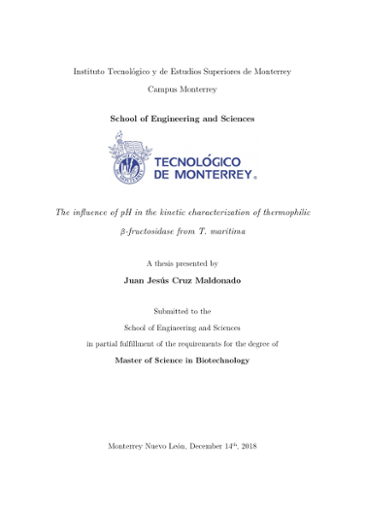| dc.contributor.advisor | Ramírez Medrano, Alicia | |
| dc.contributor.advisor | Gómez Sánchez, Carlos Eduardo | |
| dc.creator | Cruz Maldonado, Juan Jesús | |
| dc.date.accessioned | 2019-01-03T16:29:35Z | |
| dc.date.available | 2019-01-03T16:29:35Z | |
| dc.date.created | 2019-01 | |
| dc.identifier.citation | Cruz Maldonado, J. J. (2018). The influence of pH in the kinetic characterization of thermophilic β -fructosidase from T . maritima. Instituto Tecnológico y de Estudios Superiores de Monterrey. | en_US |
| dc.identifier.uri | http://hdl.handle.net/11285/632732 | |
| dc.description.abstract | Given their advantageous features such as high reaction rates, increased specificity and negligible by-products generations, enzyme-catalyzed reactions are keep gaining ground over conventional chemical process. However, only a small fraction of
currently known enzymes, is used in commercial processes at a large scale. Catalytic efficiency and stability reduction at drastic process conditions are some of the factors that restrain large scale biocatalysis boom. This can be exemplified in the industrial hydrolysis of sucrose where, at process conditions, S. cerevisiae β-fructosidase (BfrA) is subjected to thermal denaturation and substrate inhibition. In this regard, kinetic characterization of a thermophilic BfrA could help to overcome these inconveniences. Therefore, the main objective of this study is the kinetic characterization of T. maritima BfrA through a mathematical model that accounts for the simultaneous effects of pH and substrate inhibition over catalytic activity and kinetic parameters. Fitting of proposed model to experimental data yielded a surface of response which confirmed substrate uncompetitive inhibition at 146 mM of sucrose and optimum pH interval between 4.5 and 5.5. Estimation of kinetic parameters showed that Km and Ki are slightly pH dependent while vmax demonstrated to be sensitive to pH shifts. Likewise, estimated ionization constants of 3.0 and 6.60 suggested side-chain carboxylic groups of nucleophilic Asp and general acid/base Glu, which agreed with previous structural and mechanistic studies of T. maritima BfrA. These results suggest that the proposed model provide good estimations with respect of expected enzymatic activity of T. maritima BfrA at different conditions of pH and sucrose concentrations. Hence, can be useful for further kinetic characterization studies with potential application in biocatalysis process design. | en_US |
| dc.format.extent | 77 | en_US |
| dc.format.medium | Texto | en_US |
| dc.language.iso | eng | en_US |
| dc.publisher | Instituto Tecnológico y de Estudios Superiores de Monterrey | esp |
| dc.relation.ispartof | N/A | en_US |
| dc.rights | Open Access | en_US |
| dc.rights.uri | http://creativecommons.org/licenses/by/3.0/us/ | * |
| dc.subject | 2 BIOLOGÍA Y QUÍMICA | en_US |
| dc.title | The influence of pH in the kinetic characterization of thermophilic β-fructosidase from T. maritima | en_US |
| dc.type | Tesis de Maestría / master Thesis | en_US |
| dc.publisher.institution | Instituto Tecnológico y de Estudios Superiores de Monterrey | en_US |
| dc.subject.keyword | Kinetic characterization | en_US |
| dc.subject.keyword | pH-dependece | en_US |
| dc.subject.keyword | pKa | en_US |
| dc.subject.keyword | β-fructosidase | en_US |
| dc.subject.keyword | Thermotoga maritima | en_US |
| dc.contributor.institution | Campus Monterrey | en_US |
| dc.subject.discipline | Ingeniería y Ciencias Aplicadas / Engineering & Applied Sciences | en_US |
| dc.description.degree | Maestría en Ciencias con Especialidad en Bitoecnología | en_US |
| dc.audience.educationlevel | Empresas/Companies | en_US |
| dc.audience.educationlevel | Estudiantes/Students | en_US |
| dc.audience.educationlevel | Investigadores/Researchers | en_US |
| dc.audience.educationlevel | Maestros/Teachers | en_US |
| dc.audience.educationlevel | Otros/Other | en_US |
| dc.audience.educationlevel | Público en general/General public | en_US |
| refterms.dateFOA | 2019-01-03T16:29:36Z | |
| dc.relation.impreso | 2018-12 | |


